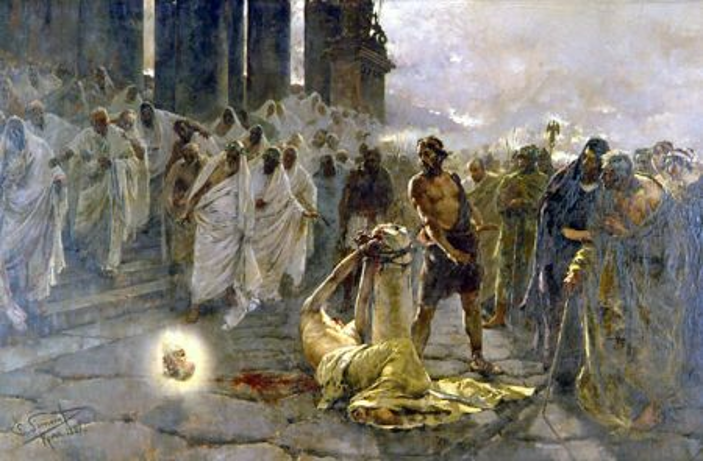Skeptics like Bart Ehrman will use Apollonius of Tyana as a challenge to Jesus’ uniqueness. Apollonius lived in the first century. His birth was supernatural. He also performed miracles and appeared to people after his death. Sounds familiar, right? Critics will then conclude that the story of Jesus isn’t special.
Apologists will then retort that the Apollonius’ biography was written long after his death. It isn’t until about 100 years later that Philostratus wrote his biography. Therefore, the story we have about his life couldn’t be based on eyewitness testimony. But the Gospels are based on the accounts of witnesses.
And this is where critics will say “Oh really? The Gospels came long after Jesus’ death too!” For example, here’s Bart Ehrman:
“The very first surviving account of Jesus’ life was written thirty-five to forty years after his death. Our last canonical Gospel was written sixty to sixty-five years after his death. That’s obviously a lot of time.”
How Jesus Became God, pp 90
We know that Jesus died around 30-33 AD. But most contemporary scholars date Mark roughly around 70 AD. Matthew and Luke date to 80-90 AD. And John dates to 95-100 AD. We have this long chain of storytellers circulating stories about Jesus for decades. The tales grew in the telling. While the problem isn’t as bad as Philostratus’ bio of Apollonius, 40-75 years is a long enough time for legends to creep in.
The Main Reason Why Critics Give The Gospels A Later Date
So why do scholars date the gospels so late? There’s one big reason: Jesus predicted the destruction of the Temple and Jerusalem. That happened in 70 AD. And we know predictive prophecy isn’t a real thing, so the Gospel authors must have put these words like these in Jesus’ mouth:
“…as he came out of the temple, one of his disciples said to him, “Look, Teacher, what wonderful stones and what wonderful buildings!” And Jesus said to him, “Do you see these great buildings? There will not be left here one stone upon another that will not be thrown down.” (Mark 13:1-2)
“…when he drew near and saw the city, he wept over it, saying, “Would that you, even you, had known on this day the things that make for peace! But now they are hidden from your eyes. For the days will come upon you, when your enemies will set up a barricade around you and surround you and hem you in on every side and tear you down to the ground, you and your children within you. And they will not leave one stone upon another in you, because you did not know the time of your visitation.” (Luke 19:41-44)
Scholars call this ‘vaticinium ex eventu’. That means that the text is written so as to appear that the prophecy had taken place before the event, when in fact it was written after the events supposedly predicted.
Well, pardon me, Mr. Skeptic. It seems like your anti-supernatural bias is showing. While real examples of this exist in history, there are a few problems with this view in regard to the Olivet Discourse.
The Olivet Discourse Does Not = Late Dating
For starters, if the Gospels are late, why is there no emphasis on the fulfillment of Jesus’ predictions? Luke actually does this in Acts. Here’s a noteworthy example:
“Now in these days, prophets came down from Jerusalem to Antioch. And one of them named Agabus stood up and foretold by the Spirit that there would be a great famine over all the world (this took place in the days of Claudius).” (Acts 11:27-28)
It’s odd that Luke went out of his way to emphasize a prophecy by such an obscure figure. Why would Luke capitalize on that, but not highlight a fulfilled prophecy about the main character of his story?
Furthermore, several of Jesus’ warnings about the destruction of Jerusalem and the Temple make no sense if Jesus gave them after the event. This is true of all three synoptic gospels.
“But when you see the abomination of desolation standing where he ought not to be (let the reader understand), then let those who are in Judea flee to the mountains…Pray that it may not happen in winter.” (Mark 13:14, 18)
Matthew adds: “Pray that your flight may not be in winter or on a Sabbath.” (Mt. 24:10)
And Luke writes: “But when you see Jerusalem surrounded by armies, then know that its desolation has come near. Then let those who are in Judea flee to the mountains, and let those who are inside the city depart, and let not those who are out in the country enter it...” (Luke 21:21)
The Romans destroyed the Temple in the Summer of 70 AD. It makes no sense for Luke to add a warning about not entering into Jerusalem if the city was already destroyed.
It is also baffling why Matthew or Mark would add commands to pray about something that didn’t take place at the particular time that it happened. New Testament scholar Dale Allison writes “What would be the point of inserting an imperative to pray about a past event, that does not take place at a particular time?”
13 Good Historical For The Early Dating Of The Gospels:
What about early dating? Are there any arguments that are in favor of it? Yep, there sure are. There’s a lot of things that are conspicuous by their absence when we look at Acts.
Luke was the first church historian. And Acts is the sequel to his own gospel, which he says he was careful to interview eyewitnesses about. (Luke 1:1-4) There’s a lot of interesting details we find out about life and (hard) times of the early church.
We read about the martyrdom of James the brother of John. (See Acts 12:1-3) We find out about the martyrdom of Stephen. (See Acts 7:56-60) We hear about the early church persecution of Peter and Paul. We follow Peter in the first half of the book, and then we get up close with Paul in the last half of the book.
There are some big events that are missing from Acts that you’d expect to find from such a thorough storyteller like Luke. We’ll now look at 13 reasons why scholars — even some non-conservative ones — date the Gospels earlier.
1. The Death Of Paul
At the end of Acts, Paul is under house arrest in Malta while having his own healing revival. Paul’s execution was in 62-64. After being Paul’s biographer for a huge portion of the book, this seems like a huge event for Luke to fail to mention. Luke has been keenly interested in what is going to happen to Paul. It’s unlikely that he’d cut his book’s narrative off without telling what happened in Paul’s hearing if he were writing much later.
Adolf von Harnack was a prominent German NT scholar who changed his mind on the late dating of the Gospels and Acts. His turnabout came precisely because of the ending of Acts and that Paul is still in Rome alive and preaching. Says Harnack: “we are accordingly left with the result: that the concluding verses of the Acts of the Apostles, taken in conjunction with the absence of any reference in the book to the result of the trial of St. Paul and to his martyrdom, make it to the highest degree possible that the work was written at a time when St. Paul’s trial had not yet come to an end.”
2. The Death Of Peter
Luke was also up close with Peter in Acts, so it’s also weird that he doesn’t mention Peter’s martyrdom in 65 AD. Again, we see Stephen and James the son of Zebedee’s deaths. Yet he fails to mention the death of the towering figure who preached on Pentecost and was such a pivotal figure in his gospel? It doesn’t add up.
3. The Death Of James The Brother Of Jesus
James was a huge figure in the church of Jerusalem. He looms large in Acts. He’s also Jesus’ brother. We know from the Jewish historian Josephus that James’ martyrdom took place in 62 AD. Josephus thought it was a big enough deal to describe this event, and he was no Christian.
4. The Severe Persecutions Of Nero
Nero himself was probably to blame for a large fire that broke out in Rome. What’s an emperor to do when his capital city is in flames and it’s his own fault? Blame those weird Christians, of course.
This happened around 64 AD. We can read about it in some detail in Tacitus. It’s a strange thing for Luke not to mention this. Luke mentions the church’s persecution in other places, like Jerusalem, Phillipi, Ephesus and more places. Luke also at length discusses relief efforts for the impoverished saints in Jerusalem during a famine.
But he doesn’t mention one of the more gruesome persecutions of the time?
5. The Destruction Of The Temple And The Second Coming
This might be the most convincing proof of them all. The passages in Matthew that describe the destruction of Jerusalem and Jesus’ second coming seemingly leave no time between the two events. Reading Mark and Luke, the interval between the two events is brief. Skeptics like Bertrand Russell and Bart Ehrman have been quick to pounce on this as if Jesus was a failed apocalyptic prophet.
I’m not here to give a theological explanation, although many have been offered throughout the centuries. The association of the destruction of Jerusalem with the return of Jesus wouldn’t exist if the composition of the Gospels was after the destruction of the Temple. Surely there would’ve been some explanation or indication that the two events were not to stand in so close juxtaposition.
6. Luke Was True To His Times
Luke has a lot to say about issues of the day that wouldn’t have been relevant after the destruction of Jerusalem. For instance, there was the brouhaha about how to deal with Gentiles now being members of the church. There’s also mention of the division between the Palestinian and Hellenistic Jews. These would not be relevant after Jerusalem’s destruction. Disputes like these are absent in the writings of early church fathers.
7. Paul Quotes Luke As Scripture
The letters to Timothy proceeded Paul’s death. Paul writes:
The elders who rule well are to be considered worthy of double honor, especially those who work hard at preaching and teaching. For the Scripture says, “You shall not muzzle the ox while he is threshing,” and “The laborer is worthy of his wages.” (1 Tim. 5:17–18)
Paul quotes Deuteronomy alongside Luke. This saying is in Luke 10:7. Scriptures refer to something written down, so this goes beyond oral tradition. This takes for granted that they had familiarity with what Scriptures Paul was talking about.
I understand some critics say Paul didn’t write 1 Timothy. But I’d humbly argue that they are incorrect in their assessment. The main reasons to reject Pauline authorship are thin, as I cover here.
8. Jesus Approves Of The Temple Tax
NT scholar Robert Gundry tells why this is so significant:
“The distinctive passage [of Matthew 17:24–27] teaches that Jewish Christians should not contribute to their fellow Jews’ rejection of the gospel by refusing to pay the Temple tax. This exhortation not only shows Matthew’s concern to win Jews. It specifically favors a date of writing before AD 70; for after the destruction of God’s temple in Jerusalem the Romans shifted the tax to the temple of Jupiter Capitolinus in Rome (Josephus J.W. 7.6.6 §218; Dio Cassius 65.7; Suetonius Dom. 12), and m. Šeqal. 8.8 says that the laws concerning “the Shekel dues…apply only such time as the Temple stands...
Surely Matthew does not include this passage to support the upkeep of a pagan temple, for then the argument implies that the disciples are sons of the pagan god! Nor can we suppose that Matthew is urging Jewish Christians to support the school of pharisaical rabbis that formed in Jamnia yet during the aftermath of the Jewish rebellion, for he excoriates the Pharisees throughout his Gospel. The argument from 17:24–27 for an early date gains further cogency from the evidence that Matthew himself composed the passage.“
9. Swearing By The Temple
In Matthew 23:16-22, Jesus is excoriating the scribes and Pharisees. He says:
“Woe to you, blind guides, who say, ‘If anyone swears by the temple, it is nothing, but if anyone swears by the gold of the temple, he is bound by his oath.’ You blind fools! For which is greater, the gold or the temple that has made the gold sacred? And you say, ‘If anyone swears by the altar, it is nothing, but if anyone swears by the gift that is on the altar, he is bound by his oath.’ You blind men! For which is greater, the gift or the altar that makes the gift sacred? So whoever swears by the altar swears by it and by everything on it. And whoever swears by the temple swears by it and by Him who dwells in it. And whoever swears by heaven swears by the throne of God and by Him who sits upon it.“
This text makes as much sense as me talking to a Gen Z audience about slide projectors or phone booths. Unless the temple still stood, all of these practices would be antiquated.
10 Gift At The Altar
In Matthew 5:23-24 we read “So if you are offering your gift at the altar and there remember that your brother has something against you, leave your gift there before the altar and go. First, be reconciled to your brother, and then come and offer your gift.”
It could be the case that Matthew was faithfully passing on a saying of Jesus, but it doesn’t make as much sense for Matthew to relay it for the very important reason that no one could obey it if the temple was no longer standing!
11. Jewish Persecution
If Matt 23:34 is reflecting current Jewish persecution of Christians by the synagogue, the verse implies an authority to punish that Jewish leaders did not likely have after the temple destruction.
12. Patristic Evidence
Irenaeus was a student of Polycarp. Polycarp was a student of John. Therefore Irenaeus was in a position to know about the composition of the Gospels. In his book Against Heresies, he writes: “Matthew also issued a written Gospel among the Hebrews in their own dialect, while Peter and Paul were preaching at Rome, and laying the foundations of the Church.” (3.1)
That’s interesting. The internal evidence we have for the early dating of the Gospels now matches the external dating.
13. Who Was The Unnamed Disciple Who Was “Famous In The Gospel?”
2 Corinthians 8:18-19 speaks of a famous unnamed disciple that several church fathers (Origen, Jerome) and some commentators believe is referring to Luke.
“We have sent along with him the brother whose fame in the things of the gospel has spread through all the churches and not only this, but he has also been appointed by the churches to travel with us in this gracious work…”
The commentator Barnes observes
“…Luke was the companion and intimate friend of Paul and attended him in his travels. From Acts 16:10-11, where Luke uses the term “we,” it appears that he was with Paul when he first went into Macedonia, and from Acts 16:15 it is clear that he went with Paul to Philippi. From Acts 17:1, where Luke alters his style and uses the term “they,” it is evident that he did not accompany Paul and Silas when they went to Thessalonica, but either remained at Philippi or departed to some other place.
He did not join them again until they went to Troas on the way to Jerusalem; Acts 20:5. In what manner Luke spent the interval is not known…it seems probable that Luke is the person referred to by the phrase “whose praise is in the gospel throughout all the churches.” This would be more likely to be applied to one who had written a gospel, or a life of the Redeemer that had been extensively circulated, than to any other person.“
While this is admittedly speculative, it does make sense of Paul quoting Luke’s gospel.
The Gospels Were Written Early
NT scholar EP Sanders writes that “there is no material in Mark which must be dated after 70.” If that’s true of Mark, it’s true of Matthew and Luke as well. And if Acts was written before Paul’s death, that means the Gospel of Luke was written when Paul was still alive and kicking. We’ve seen that Paul quotes Luke as scripture. And history tells us Paul died in 62 AD.
There are also several indicators that Matthew’s Gospel was written before 70 AD as well. If both Gospel writers used Mark as a source, then Mark has to be dated even earlier than 62 AD. That means this alleged time-gap has been greatly shortened 40-60 years to 20-30 years. If Paul refers to Luke in 2 Corinthians, then his Gospel was being circulated before 55 AD.
Furthermore, if Paul quotes Luke’s Gospel as scripture, and Paul has met with Peter and James — who were living eyewitnesses to the life of Jesus — then it’s not difficult to imagine the other apostles were aware of the written Gospels as well. They could have policed and addressed necessary correctives if they were inaccurate, and they also could have been sources for the Gospels. We know that the church father Papias (125-130 AD) tells us that Mark’s Gospel was based on Peter’s preaching.
This doesn’t compare to the legend of Apollonius after all. They are close to the events.
Recommended resources related to the topic:
The New Testament: Too Embarrassing to Be False by Frank Turek (DVD, Mp3, and Mp4)
Why We Know the New Testament Writers Told the Truth by Frank Turek (DVD, Mp3 and Mp4)
The Top Ten Reasons We Know the NT Writers Told the Truth by Frank Turek (Mp3)
Erik Manning is a Reasonable Faith Chapter Director located in Cedar Rapids, Iowa. He’s a former freelance baseball writer and the co-owner of vintage and handmade decor business with his wife, Dawn. He is passionate about the intersection of apologetics and evangelism.
Original Blog Source: http://bit.ly/31NPx0d














